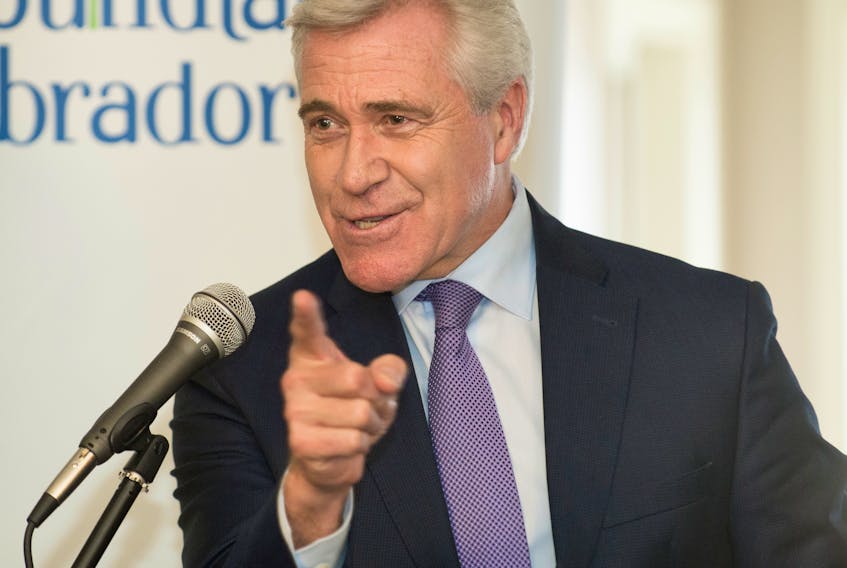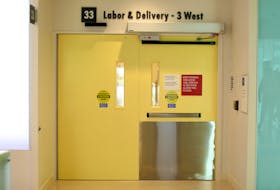Premier Dwight Ball was active on Twitter at 6:30 a.m. Wednesday, directing a message to U.S. President Donald Trump about trade relations.
It included a formal letter, sent the day before, inviting the president to the Broadway musical “Come From Away,” referring to new “extremely troubling” Canada-U.S. trade policies and “unjustified tariffs,” while promoting “the virtues of a positive relationship.”
The leader of Canada’s most easterly province, a minor voice politically in international trade negotiations, Ball told The Telegram his actions were in direct response to the use of “national security” as a reason for the United States imposing tariffs on Canadian steel and aluminum, and other recent comments by Trump about the North American Free Trade Agreement (NAFTA) renegotiations.
The statements, the premier suggested, haven’t made sense.
RELATED STORIES:
N.L. pays $700,000 in legal fees to fight U.S. tariffs
Softwood lumber supports could aid Corner Brook mill
RELATED LINK:
Cape May County Herald: Newsprint tariff a punch in the gut
“This relationship (between Canada and the U.S.) is not simply a transaction,” he told The Telegram, saying good faith has been built over time and should be acknowledged.
The point of taking his message to social media, he said — in one of several one-on-one interviews with reporters throughout the morning — boils down to a desire to encourage more “rational” trade negotiations, and ultimately see progress on the new NAFTA.
Without it settled, there is uncertainty on multiple fronts.
But he is particularly concerned over what existing U.S. tariffs on uncoated groundwood paper products moving from Canada into the United States mean for Newfoundland and Labrador. The tariffs are something he says could be more swiftly addressed if things were to get back on solid ground with Canada-U.S. government relations on trade.
The preliminary tariffs on uncoated groundwood paper products — including newsprint — resulted from investigations launched after complaints to the U.S. government from the Washington-based North Pacific Paper Co.
The anti-dumping and countervailing tariffs hit Newfoundland and Labrador’s only remaining paper mill particularly hard when introduced earlier this year. Assessments for the U.S. Department of Commerce resulted in products from the Corner Brook Pulp and Paper Mill, a Kruger Inc. operation, being hit with a 32.09 per cent combined duty, to pay at the border.
On the other side of the country, Catalyst Paper in British Columbia was also hard hit with the tariffs.
That company announced on May 25 it is selling its U.S.-based operations — three mills in Wisconsin, and operations in Dayton, Ohio — for US$175 million, to Nine Dragons Paper (Holdings) Ltd. listed in Hong Kong. It said the transaction would allow it to re-pay a significant portion of its debt.
“We continue to pursue opportunities to improve the competitiveness of our company and our industry,” Catalyst president and CEO Ned Dwyer, said in a statement at the time.
“We also continue to work with the provincial and federal governments in our defence against the unwarranted imposition of U.S. countervailing and anti-dumping duties.”
Ball said the Government of Newfoundland and Labrador has not provided any specific financial supports to the Corner Brook mill while it faces its own losses, at least not to date. He indicated there are negotiations underway.
“We’ll see what options we have available to us and what they would look like,” he said. “It’s too early to tell because we’re still talking, and the federal government right now, as I said, are heavily involved. But I do believe at the end of the day there’s a refund coming, so whatever it is, it would be something that’s interim and either short- or mid-term anyway.”
The “refund” refers to the review of the preliminary tariffs still to come, and what the premier expects will be a decision ultimately compensating for losses.
But apart from the pain felt right now by Canadian producers, tariffs on newsprint being shipped into the United States have already led to operational changes and layoffs at American newspapers, including a reported 50 job losses at the Tampa Bay Times, to offset the higher cost of newsprint in that country.
While Newfoundland and Labrador’s premier was on social media Wednesday morning, readers of the weekly Cape May County Herald in southern New Jersey were able to access the latest editorial from managing editor Al Campbell, about how tariffs on Canadian newsprint have “played havoc” with local news outlets in the United States.
“Large metropolitan dailies are especially squeezed due to the scale of their operations, but it’s no different at the Herald,” Campbell stated.
“If there ever was a fine example of an ‘atomic fly swatter,’ (i.e. over-reaction to a problem) the tariff on Canadian newsprint is it.”
Speaking with The Telegram, Campbell said his paper is physically printed in Lancaster, Pa., but printers such as the one serving his paper have been passing on newsprint costs to local papers. Without those papers then passing the cost to customers, the local papers feel the final pinch and have to manage as they can.
“I can’t understand why this is happening,” Campbell said, reiterating a point he made in print — that the industry has long been served by Canadian newsprint producers, and the remaining U.S. paper mills could run their operations flat out and not meet the demand.
“It’s really something (where) I take hope some cooler heads do prevail,” he said.
“I just hope that maybe that would bring a bit of sanity to the table.”
There has been a bi-partisan effort launched in the U.S. Senate to try to specifically address the newsprint issue, focused on the ability of American news companies to fairly source the materials they need.
Sponsored by Senator Susan Collins, a Maine Republican, the bill for the Protecting Rational Incentives in Newsprint Trade (PRINT) Act would suspend the newsprint tariffs, and allow for a review of the newsprint business and the publishing industry’s woes.
What would it mean in the end?
The results, according to local news reports, would be sent to Trump, who would be asked to certify the tariffs are in the country’s economic interest.









